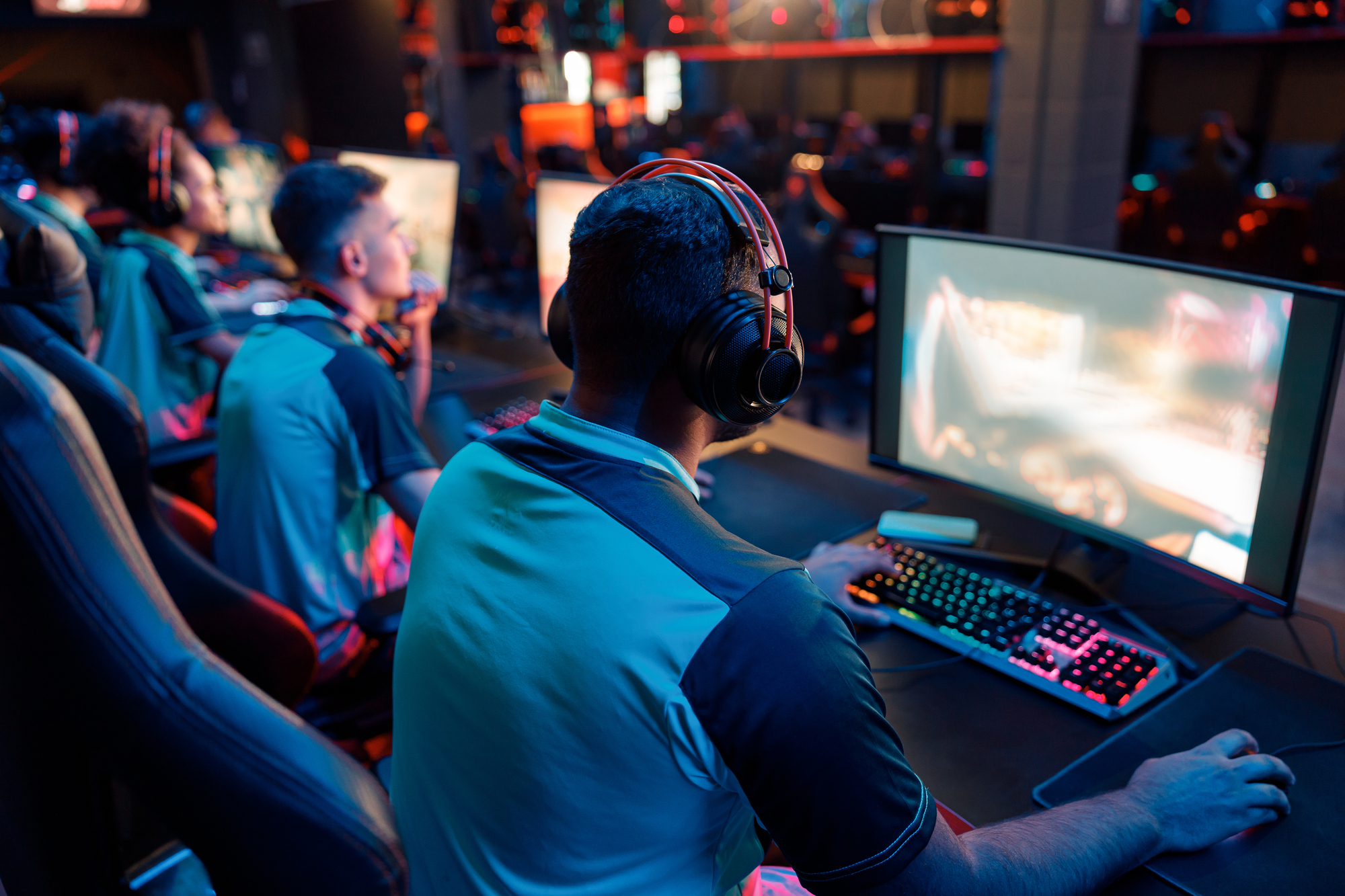

Gaming continues to shape the future of technology in profound ways. The industry’s rapid growth and innovation drive advancements in virtual reality, augmented reality, artificial intelligence, and cloud computing. These technologies, refined through gaming applications, find uses across various sectors including education, healthcare, and business.
As gaming evolves, it pushes the boundaries of hardware capabilities. Powerful graphics processors, originally designed for gaming, now fuel scientific simulations and machine learning algorithms. The demand for seamless online experiences in multiplayer games has led to improvements in network infrastructure and data centers.
Gaming also serves as a testbed for new user interfaces and interaction methods. Motion controls, voice commands, and eye-tracking technologies, first popularized in games, are now being adapted for accessibility tools and productivity applications. This crossover between gaming and other industries fosters a cycle of innovation that benefits society as a whole.
Influence of Gaming on Technology Advancement
Gaming has become a major driver of technological progress, pushing boundaries in graphics, processing power, and interactive experiences. This influence extends far beyond entertainment, shaping advancements in various fields.
Pioneering Gaming Tech
The gaming industry consistently pushes hardware capabilities to their limits. Graphics cards developed for games now power AI research and cryptocurrency mining. High-refresh rate displays, originally created for competitive gaming, have found applications in professional video editing and medical imaging.
Gaming has also driven advances in network infrastructure. The demand for low-latency online gaming has spurred improvements in internet protocols and content delivery networks. These enhancements benefit video streaming, remote work tools, and other internet-based services.
Haptic feedback, a technology refined in gaming controllers, is now used in medical training simulations and robotic surgical systems. The precision and responsiveness developed for games translate well to these critical applications.
The Rise of AR and VR in Gaming
Augmented reality (AR) and virtual reality (VR) technologies have found a natural home in gaming. These immersive technologies are rapidly evolving, driven by the gaming industry’s constant push for more engaging experiences.
VR headsets, initially popularized by gaming, are now used in architectural visualization, virtual tourism, and therapeutic applications. The quest for lighter, more comfortable VR hardware has led to advancements in display technology and motion tracking.
AR, showcased in mobile games, has applications in education, retail, and industrial settings. Improvements in smartphone cameras and processors, partly driven by AR gaming demands, enable more sophisticated real-world integrations.
AI’s Role in Game Development
Artificial intelligence plays an increasing role in game development and gameplay. Machine learning algorithms create more realistic non-player characters (NPCs) and generate dynamic game content.
AI-powered procedural generation techniques, refined in games, now assist in creating visual effects for films and designing complex 3D models for various industries.
Natural language processing, improved through voice-controlled games and in-game chat systems, contributes to the development of more advanced virtual assistants and customer service bots.
Economic Impact of Gaming Innovations
Gaming innovations have significantly influenced economic growth across various sectors. The industry’s advancements have created new revenue streams, transformed advertising approaches, and sparked innovative business models.
Revenue Streams in Gaming
The gaming industry has diversified its income sources beyond traditional game sales. In-game purchases have become a major revenue driver, with players buying virtual items, character customizations, and gameplay enhancements. Subscription models have gained popularity, offering players access to game libraries or exclusive content for a recurring fee.
Mobile gaming has emerged as a lucrative market, generating substantial revenue through free-to-play games with microtransactions. Esports has grown into a billion-dollar industry, attracting sponsorships, media rights deals, and merchandise sales.
Cloud gaming services have introduced new monetization opportunities by providing access to high-quality games without the need for expensive hardware.
Gaming and Advertising
Advertisers have recognized the potential of the gaming audience, leading to innovative marketing strategies. In-game advertising has evolved from simple banner ads to immersive brand integrations within game worlds.
Product placement in games has become sophisticated, with real-world brands appearing naturally in virtual environments. This approach offers advertisers a non-intrusive way to reach engaged audiences.
Influencer marketing has thrived in the gaming space, with popular streamers and content creators promoting products to their dedicated followers. Brands sponsor gaming events and tournaments, gaining exposure to millions of viewers worldwide.
Emerging Business Models
Blockchain technology and non-fungible tokens (NFTs) have introduced new concepts of digital ownership in gaming. Players can now truly own and trade in-game assets, creating secondary markets with real economic value.
Play-to-earn games have gained traction, allowing players to earn cryptocurrency or NFTs through gameplay. This model has created opportunities for players in some regions to earn a living through gaming activities.
Cross-platform gaming has expanded market reach, enabling developers to monetize their titles across multiple devices and ecosystems. Gaming companies are exploring partnerships with other entertainment sectors, creating transmedia franchises that generate revenue from games, movies, merchandise, and more.
Gaming as a Catalyst for Cross-Industry Growth
Gaming technology drives innovation across sectors, spurring advancements in mobile, cloud, healthcare, and education. Its widespread influence shapes social interactions and cultural norms globally.
Gaming’s Influence on Mobile and Cloud Technologies
Gaming has accelerated the development of mobile and cloud technologies. Smartphones have become powerful gaming platforms, pushing manufacturers to improve processing capabilities and display quality. This has led to faster, more efficient devices for all users.
5G technology enhances mobile gaming experiences by reducing latency and enabling smoother gameplay. Cloud gaming services leverage this improved connectivity, allowing players to stream high-quality games without expensive hardware.
The demand for seamless gaming experiences has driven cloud infrastructure advancements. These improvements benefit other industries relying on cloud computing, such as finance and e-commerce.
Educational and Healthcare Advancements Through Gaming
Gaming techniques have revolutionized education and healthcare. Interactive learning games make complex subjects more engaging and accessible to students of all ages. These tools can adapt to individual learning styles, improving retention and comprehension.
In healthcare, serious games aid in rehabilitation and therapy. Patients recovering from injuries or managing chronic conditions can use gamified exercises to stay motivated and track progress.
Virtual reality games assist medical professionals in training for complex procedures. Surgeons can practice operations in risk-free environments, enhancing their skills before performing real surgeries.
Social and Cultural Impacts of Gaming
Gaming has transformed social interactions and cultural norms. Online multiplayer games create global communities, fostering cooperation and competition across borders. These platforms often serve as social spaces where people form lasting friendships and relationships.
Esports has emerged as a significant cultural phenomenon, with professional gamers achieving celebrity status. This has created new career opportunities and changed perceptions of gaming as a legitimate profession.
Gaming influences other media, with game-inspired movies, TV shows, and books becoming increasingly popular. This cross-pollination of ideas enriches cultural narratives and expands creative possibilities across industries.
Futuristic Gaming and Society
Gaming continues to shape technological advancements and social interactions in profound ways. Its influence extends beyond entertainment, affecting economies, communities, and virtual worlds.
The Metaverse and Its Implications
The metaverse represents a convergence of digital spaces where users interact through avatars. Games like Fortnite have laid the groundwork for this concept, hosting virtual concerts and events within their digital environments. As the metaverse expands, it will likely blur the lines between gaming, social media, and daily life.
Virtual spaces may become extensions of physical workplaces and classrooms. This shift could change how people socialize, learn, and conduct business. The metaverse also raises questions about digital identity and ownership of virtual assets.
Privacy and security concerns will need to be addressed as users spend more time in these immersive digital worlds. The development of metaverse technologies will likely drive advancements in VR, AR, and haptic feedback systems.
Virtual Economies and In-Game Assets
Digital economies within games are growing in complexity and real-world value. Many multiplayer games now feature marketplaces where players can buy, sell, and trade virtual items. These in-game economies can have significant impacts on player behavior and game design.
Blockchain technology is being integrated into some games, allowing for verifiable ownership of digital assets. This development could lead to more robust virtual economies and new forms of digital property rights.
The rise of play-to-earn models in gaming is creating opportunities for players to generate income through gameplay. This trend may reshape perceptions of gaming as a leisure activity and could have broader economic implications.
The Societal Role of Gaming Communities
Gaming communities have become powerful social networks, fostering connections across geographical boundaries. These groups often extend beyond gameplay, forming support systems and cultural hubs for members.
Multiplayer games serve as social platforms where friendships are formed and maintained. The collaborative nature of many games promotes teamwork and communication skills that can translate to real-world scenarios.
Gaming communities can be catalysts for social change, organizing charity events and awareness campaigns. They also provide spaces for marginalized groups to find acceptance and representation.
The influence of gaming culture on mainstream media and fashion continues to grow, reflecting its increasing social significance. As gaming becomes more widespread, its communities will likely play a larger role in shaping broader societal trends and values.










